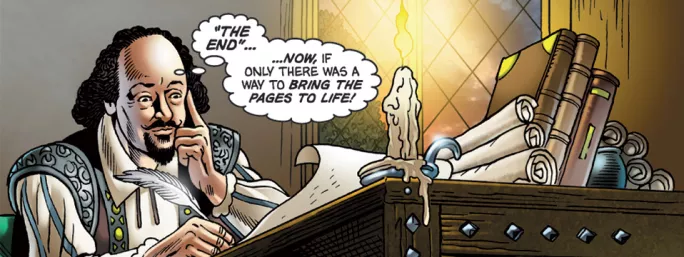Could a Shakespearean comic book save your classes on the Bard?
I have painful memories of studying the Merchant of Venice at school. No one enjoyed it, as no one really understood what was going on. The language was foreign to our young ears and the pages of endless text seemed impenetrable.
Our committed teacher carried on trying to educate us all the same, enthusing about the wonderful language of the Bard, but would he have had more luck if the play had been introduced to us through a graphic novel? Would modern renderings of the words, expressed in speech bubbles next to pretty pictures, have piqued our interest in a way our official book of the play, with its Elizabethan language and iambic pentameter, did not?
One publisher believes it would. Classical Comics is currently touting a range of “classics made cool” graphic novels that it claims helps children over the “huge language barrier” of engaging with classical texts. As well as Shakespeare, it has also adapted other works by the likes of Mary Shelley and Charles Dickens, too.
The company says that by rendering the stories in this format, it “enhances the enjoyment for the reader by helping them to visualise characters and follow plots more easily”.
By this point, it is entirely possible that readers of this blog will have fallen into two camps.
One set have already penned half a blog about how disgusting this whole concept is and how it is symptomatic of a dumbing down of education (as, perhaps predictably, the Daily Mail already has done). It would make no difference to some that the company has a version of the classics with the original words; the mere rendering of the classics in a graphic format would be enough to make their blood boil.
The other set are cheering because, at last, their Friday afternoon class might make at least some effort at following the plot of Frankenstein.
The angry group might ask the cheering group whether their classes have, in fact, had any engagement with Shakespeare at all, considering his words have been converted to modern parlance, shoved into speech bubbles and put in the context of a graphic novel.
The question in the other direction might be whether any engagement is better than no engagement, and why you should discard a potential route into Shakespeare or Dickens, denying a child the right of that sudden lightbulb moment when it all suddenly makes sense.
Yet, in my experience of going into classrooms across the country, the majority of teachers don’t take such an oppositional view of things. They pick and choose resources and strategies based on their knowledge of the students in front of them and sometimes that can mean Dickens is explored in its raw, long-sentenced beauty and at other times it can mean the themes of Oliver Twist are conveyed via a class dramatisation of The Only Way Is Essex.
Teachers will make the same judgement on this latest tactic for getting kids into the classics. And they should be trusted to do so.
Keep reading for just £1 per month
You've reached your limit of free articles this month. Subscribe for £1 per month for three months and get:
- Unlimited access to all Tes magazine content
- Exclusive subscriber-only stories
- Award-winning email newsletters
